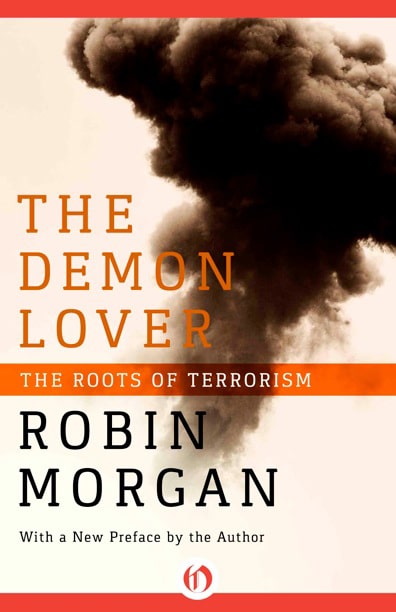The Demon Lover
The Roots of Terrorism
The first in-depth feminist analysis of violence, updated for a post-9/11 world.

Washington Square Press/Simon & Schuster, 2001 (2nd Edition)
W.W. Norton & Company, 1989 (1st Edition)
“Important and compelling . . . Morgan is intense and at times magnificent.” —THE NEW YORK TIMES BOOK REVIEW
“Morgan’s writing is evocative and accessible, and her message important.” —SAN FRANCISCO EXAMINER CHRONICLE
“Extremely intelligent, passionate—the fresh air of original thinking.” —COSMOPOLITAN
“Admirable work. The deepest strength is her writing, which is quietly powerful and unsentimentally lyrical.” —THE NEW STATESMAN
“The first feminist treatise on terrorism. . . . Presents not only incisive analysis but compelling new material: for the first time, Morgan writes of her own history as a woman warrior of the New Left. A brilliant critique.” —LIBRARY JOURNAL
“A frightening but ultimately affirmative look at cultural links between beauty and death, sexuality and terror . . . Of prime interest are Morgan’s interviews with Palestinian women on the West Bank and Gaza Strip. This is a book that women (and men) will overlook at their peril.” —KIRKUS REVIEWS
“Morgan brings a startling perspective to terrorism, which she sees as arising out of patriarchal societies’ emphasis on power, control, domination, and violence.” —PUBLISHERS’ WEEKLY
“This is an extraordinary book, disturbing in its social analysis, exhilarating in its visionary power.” —NINA AUERBACH
One of the most widely translated of Morgan’s books, The Demon Lover was Cassandra-like in its prescience: 1989. It broke new ground as the first in-depth feminist analysis of violence.
The Demon Lover: On the Sexuality of Terrorism (1st Edition, W.W. Norton) had just gone out of print after 12 years, when the September 11, 2001 tragedies occurred. A second edition, subtitled The Roots of Terrorism, was rushed into print by December, 2001 by Washington Square Press, containing a major new (updated) introduction by the author, plus her afterword, itself notable for the publication of Morgan’s “Letters from Ground Zero,” sent over the Internet after 9/11—three open letters that proliferated through cyberspace around the world like wildfire. It was a best-seller within three months of its re-emergence.
Viewing the problem as the “eroticization of violence”—the sexual charisma that violence has come to exude—Morgan traces terrorism through multiple contexts, including the political, cultural, and mythic; violent insurgence by the Left as well as by the Right, and officially sanctioned terrorism by the State and by organized religion, all come under her scrutiny.
Terrorist acts are overwhelmingly committed by men, and Morgan locates those acts on a continuum of violence that is now so “normal” as to be deemed, simply “manhood.” She analyzes “Token Terrorist” women, too—including herself, in a revealing personal chronicle of her activities in the 1960s. Also explored are women’s cross-cultural attitudes toward violence. Here, for the first time, Palestinian women speak movingly of their struggle to survive as women, through extraordinary interviews Morgan conducted in refugee camps. A final chapter, “Beyond Terror,” sets forth a compelling vision of hope for the future, in which the patriarchal thirst for death is slaked, and a new “politics of Eros” blooms.


